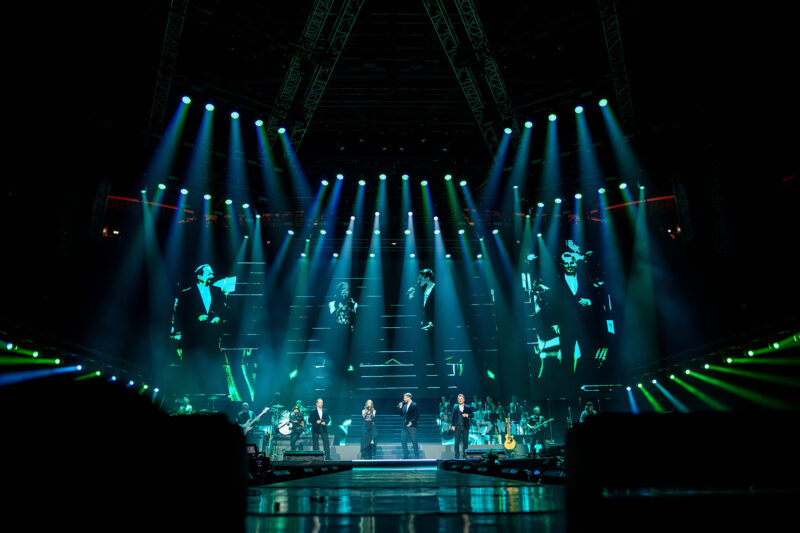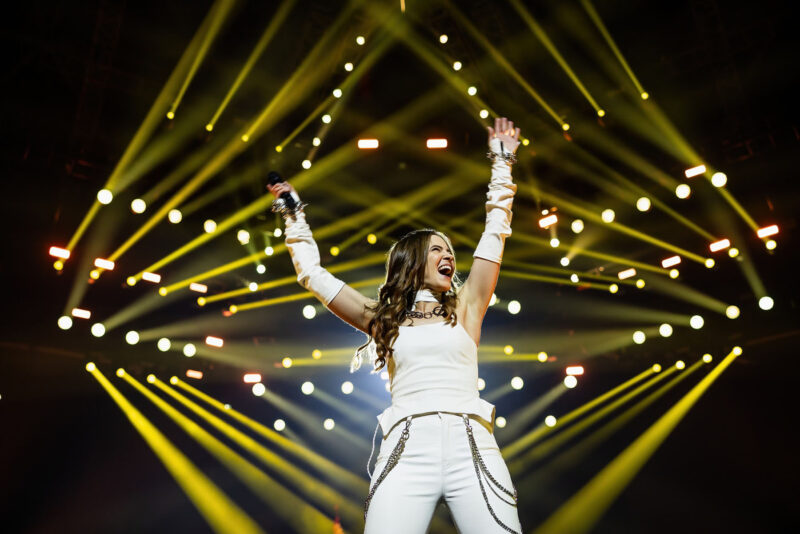
Talented Slovenian singer-songwriter Nina Pušlar played a major sold-out show in Ljubljana’s 14,400-capacity Stožice Arena which was recorded for broadcast on national TV and celebrated the dropping of some exciting new music from Pušlar, for which her team including Creative Director Anže Škrube wanted a spectacular production. Lighting Designer Amadej Šuperger from design studio Blackout specified large quantities of Robe moving lights which made up 75% of the lighting. The positions were facilitated by an angled triangular truss in the center with four bracing trusses flanked by raked grids of crisscrossing trusses in the roof above the stage, which brought a structural look and industrial tone to the performance area. It also amplified the depth of the performance space.
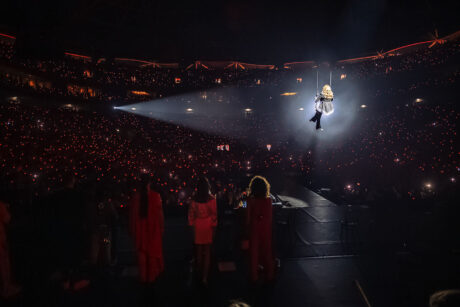 Šuperger has been working with the artist for some time. He already had a show designed for smaller venues which served as a basic starting point for this one, but Stožice required a completely new concept and an approach that was much bigger than anything that had gone before. This was both to fit the occasion and the expansive space of the arena, which is a challenging space for rigging production. “I wanted it to look impressive even without any lights turned on, hence the geometry, style and look of the metalwork,” explained Šuperger.
Šuperger has been working with the artist for some time. He already had a show designed for smaller venues which served as a basic starting point for this one, but Stožice required a completely new concept and an approach that was much bigger than anything that had gone before. This was both to fit the occasion and the expansive space of the arena, which is a challenging space for rigging production. “I wanted it to look impressive even without any lights turned on, hence the geometry, style and look of the metalwork,” explained Šuperger.
Another factor around which the lighting evolved was a substantial upstage LED screen and two side LED screens which meant an emphasis on top lighting to leave clear sightlines, especially to the screen at the back. He collaborated closely with VJ Rasta—who produces all the playback content—on this aspect of the design. The 20-camera shoot was directed by Nik Gradišnik and Anže Škrube.
When it came to populating the lighting fixtures, Šuperger used 36 Robe FORTES including two which were on two RoboSpot systems for key and back lighting. The RoboSpot operators were off to the sides of the stage. He added 28 MegaPointes to this, 42 Spiider wash beams, 40 LEDBeam 150s, 26 CycFX8s and eight PATT2013s, plus strobes, blinders, and fog machines, all supplied by busy Slovenian rental company Event Lighting. Eleven of the FORTES were used for front light and keys, with the other 25 rigged along at the back of the trussing grid and filling in the main triangle piece, ideally positioned for outlining, silhouetting and rear beam work. The key lighting was programmed by Amandej’s Blackout colleague Crt Birsa—also an LD in his own right—and was run live as dancers and guests came and went during the action-packed show.
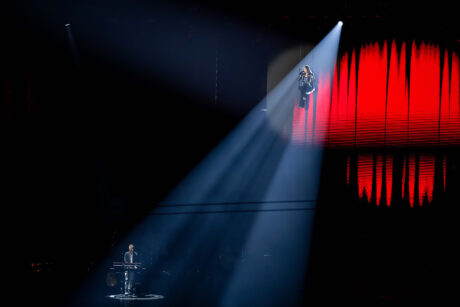 Like Birsa, Šuperger is a big fan of the Robe FORTE, especially for front lighting and he notes that the quality of light is excellent, the flesh tones are great, the shutters are perfect for fine tuning the beam and the accurate pinpointing of artists. He mixed FORTES seamlessly with the MegaPointes which were mostly rigged around the upstage areas of the horizontal trusses. MegaPointes are still his favorite fixture to date, and he loves the fact they are so fast, bright, dynamic, and come with an impressive set of colors and gobos. He also likes Spiiders, deployed for all the rear washes and in the top part of the triangle on this show. “You can do so much with Spiiders—they are fast, have a great output, good colors and are excellent fixtures even with long throws involved.”
Like Birsa, Šuperger is a big fan of the Robe FORTE, especially for front lighting and he notes that the quality of light is excellent, the flesh tones are great, the shutters are perfect for fine tuning the beam and the accurate pinpointing of artists. He mixed FORTES seamlessly with the MegaPointes which were mostly rigged around the upstage areas of the horizontal trusses. MegaPointes are still his favorite fixture to date, and he loves the fact they are so fast, bright, dynamic, and come with an impressive set of colors and gobos. He also likes Spiiders, deployed for all the rear washes and in the top part of the triangle on this show. “You can do so much with Spiiders—they are fast, have a great output, good colors and are excellent fixtures even with long throws involved.”
If MegaPointes are his favorite fixture, then LEDBeam 150s come a close second. Šuperger appreciates the small and maneuverable size, the outstandingly bright output, the zoom, and the exceptional speed of these little fixtures. Twenty were used, 10 each side, to accentuate the lines and form of the triangular shape and to create cool eye-candy effects. Šuperger notes that the LEDBeam 150s also looked great when framed by the cameras at the back of the arena capturing the long shots of the stage. Another 20 LEDBeam 150s were used for side light onstage. “They did a great job,” he commented, “and running 10 of them together gives a substantial output.”
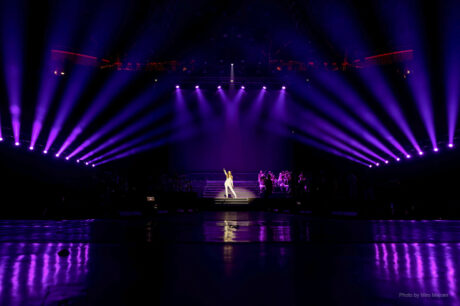
He had originally specified Tetra2s rather than CycFX 8s, but these were busy on other Event Lighting jobs, and he was happy with the predecessor CycFX 8 LED moving batten fixtures once they were all in place on the rig. They provided efficient and striking ‘fillers’ around the back of the stage, across the downstage edge and along the thrust.
He’d originally planned to use the PATT2013s for the acoustic section of the show, for guests at the end of the catwalk and for the softer songs in the set, but this changed, and they were positioned much more prominently behind the band and beneath the two side screens where their visibility enhanced this black space and offered hugely more interesting camera shots. He noted that these were ideal for scenic as well as illuminative purposes.
The main objective of the show was to present a “big, bold, modern, mainstream pop, glossy-floor pop fill of color, life and excitement to get Pušlar’s fans on their feet, moving and grooving!” explained Šuperger. The artist is a perfectionist, which is always a good challenge for the technical and creative teams he relates. “Every concert for which I design her lighting I push myself more and more.” It was also a special show for him, being his first in the venue working in the full lighting design role.
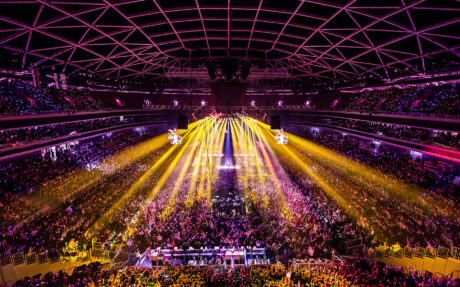 Another galvanizing factor was the timeframe. All the production elements had to be bumped in and rigged very quickly, entailing video and lighting departments working in unison to maximize the efficiency of the operation, which was a great success. Šuperger and Birsa both programmed on their own consoles and were engaged in the process right up until doors.
Another galvanizing factor was the timeframe. All the production elements had to be bumped in and rigged very quickly, entailing video and lighting departments working in unison to maximize the efficiency of the operation, which was a great success. Šuperger and Birsa both programmed on their own consoles and were engaged in the process right up until doors.
They also both worked closely ahead of the show with VJ Rasta, which was a big help having access to some of the content, so this could be blended with lighting looks and scenes. “We use the same creative language,” said Šuperger, “so this is also one of the fun parts of devising these concerts.”
Further information from Robe Lighting: www.robe.cz
Photos by Darja Straus Tisu, Fon Nejc, Kristjan Kuzmanoski, Matic Kremžar, Miro Majcen, and Primoz Piculin
